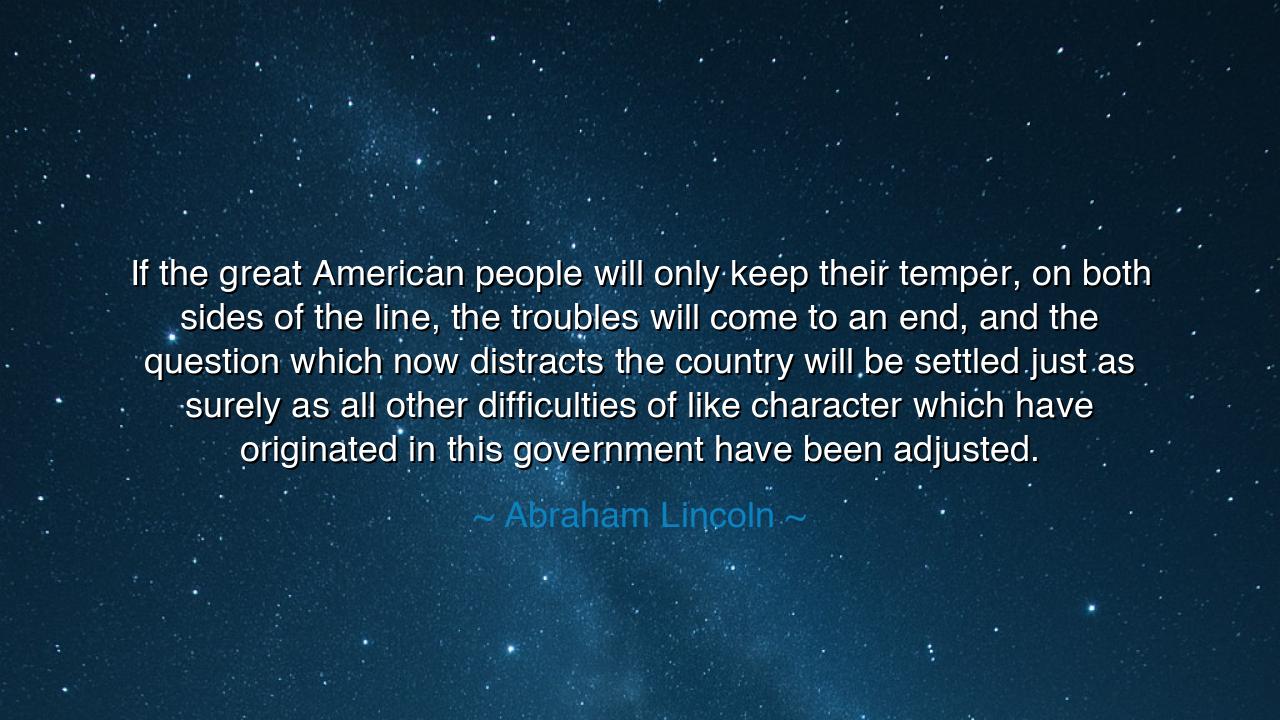
If the great American people will only keep their temper, on both
If the great American people will only keep their temper, on both sides of the line, the troubles will come to an end, and the question which now distracts the country will be settled just as surely as all other difficulties of like character which have originated in this government have been adjusted.






"If the great American people will only keep their temper, on both sides of the line, the troubles will come to an end, and the question which now distracts the country will be settled just as surely as all other difficulties of like character which have originated in this government have been adjusted." – Abraham Lincoln
In these words, Abraham Lincoln, the man who would bear the heaviest weight of the American conscience, speaks as both prophet and peacemaker. The nation stood on the edge of a precipice when he uttered these lines. The air was thick with discord, and the bonds of union strained under the growing tension between North and South, freedom and slavery, compromise and conviction. Yet even as the storm gathered, Lincoln, ever the man of calm vision, called upon the people to keep their temper—to resist hatred, vengeance, and rashness. He believed deeply in the wisdom and strength of the people themselves, trusting that reason and justice, not fury and pride, would guide them through their trials. In this, he appealed not to government or armies, but to the moral character of the Republic.
The origin of this quote lies in the months before Lincoln took office as President, in 1860 and early 1861, when the Union trembled under the threat of dissolution. Southern states, fearing the rise of abolition and the loss of their way of life, had begun to secede. The North was filled with anger and indignation, and many demanded swift retribution. Yet Lincoln, standing between two worlds, sought not destruction but reconciliation. He had not yet faced the battlefield, but already he saw the war of hearts that threatened to consume the soul of the nation. His words were spoken as a plea for patience and self-control, virtues as essential to peace as courage is to war. For he knew that no cause, however righteous, could triumph through blind rage.
Lincoln’s wisdom reflects the ancient truth that temperance is the guardian of civilization. Nations, like men, fall when they give way to passion. History’s great tragedies often begin not in the halls of kings but in the hearts of those who lose their reason to wrath. The ancients spoke of this as the tyranny of anger—the moment when men, no longer governed by virtue, destroy what they once sought to protect. Lincoln understood this with the clarity of a moral philosopher: that unity could never be restored by hatred, nor justice upheld by vengeance. The Republic, he believed, would endure not by domination, but by the renewal of mutual respect, even between enemies.
Consider the example of George Washington, nearly a century before Lincoln’s time. During the dark winter at Newburgh in 1783, his army—hungry, unpaid, and betrayed by Congress—threatened to revolt. Washington stood before them and pleaded not with orders, but with dignity. He reminded them that anger, however justified, could undo the very liberty they had fought for. His calm strength restored peace where chaos loomed. Lincoln, like Washington, sought to awaken that same spirit in the American people—to remind them that the measure of greatness lies not in wrath, but in restraint.
When Lincoln urged his people to keep their temper, he was not asking for submission; he was summoning courage of a higher kind—the courage to endure insult without hatred, to seek justice without cruelty, to confront difference without destruction. His belief in the American people was unwavering: he trusted that, as before, they would rise above division and rediscover their shared humanity. He spoke as a man of faith—faith not merely in Providence, but in the capacity of ordinary citizens to rise above their passions. He believed that time, guided by conscience, would bring resolution as it always had before.
And yet, despite his plea, war came. The Civil War, terrible and vast, tested every ideal Lincoln cherished. But even amidst the carnage, his words did not lose their meaning. When peace finally came, and the Union was preserved at such dreadful cost, the truth of his earlier wisdom was vindicated: the healing of a nation would depend not on victory alone, but on mercy. Lincoln’s second inaugural address, given in the shadow of war’s end, echoed the same spirit as his earlier plea—“With malice toward none, with charity for all.” He had remained true to his belief that temperance, forgiveness, and humility are the pillars of lasting peace.
The lesson of Lincoln’s words endures beyond his time. In every age, nations face divisions—political, social, or moral—that tempt them toward fury. Yet as Lincoln taught, anger destroys what wisdom could heal. True strength lies not in domination, but in understanding. To “keep our temper” is not to be weak, but to be sovereign over ourselves—to resist the easy path of rage and to choose the harder road of dialogue, patience, and moral clarity.
So let us remember Lincoln’s voice as a timeless call to all who live in troubled times: that reason is mightier than anger, unity stronger than vengeance, and peace more enduring than victory. When the people of any land hold fast to patience and principle, even the gravest conflict can be transformed into a new dawn. For, as Lincoln foresaw, the tempests of history may rage, but if we guard our temper, the light of justice and hope will, in the end, prevail.






AAdministratorAdministrator
Welcome, honored guests. Please leave a comment, we will respond soon